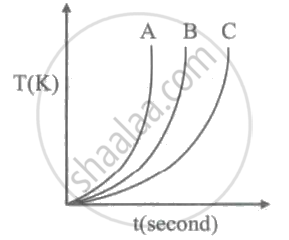Advertisements
Advertisements
Question
Calculate the mass of ice needed to cool 150 g of water contained in a calorimeter of mass 50 g at 32 °C such that the final temperature is 5 °C. Specific heat capacity of calorimeter = 0.4 J g-1 °C-1, Specific heat capacity of water = 4.2 J g-1°C-1, latent heat capacity of ice = 330 J g-1.
Solution
Heat lost by hot water = Heat gained by ice + Heat lost by calorimeter + Heat gained by melted ice
`("MC"Δ_t)_"water" + ("MC"Δ_t)_"calorimeter" = "MLL"_"F" + ("MC"Δ_t)_"Melted ice"`
∴ 150 × 4.2 (32 - 5) + 50 × 0.4 × (32 - 5) = M × 330 + M × 4.2 × (5 - 0)
∴ (150 × 4.2 × 27) + (50 × 0.4 × 27) = 330 M + 21 M
17010 + 540 = 351 M
∴ M = `17550/351`
∴ M = 50
Mass of ice required = 50g.
APPEARS IN
RELATED QUESTIONS
Write the expression for the heat energy Q received by the substance when m kg of substance of specific heat capacity c Jkg-1 k-1 is heated through Δt° C.
The specific heat capacity of water is :
Explain the term boiling point ?
Write the name.
The amount of heat absorbed at constant temperature by unit mass of a liquid to convert into gaseous phase.
Which of the following substances (A, B and C) has the highest specific beat?

The value of 'γ' for a gas is given as `gamma = 1 + 2/"f"`, where 'f ' is the number of degrees of freedom of freedom of a molecule of a gas. What is the ratio of `gamma_"monoatonic"//gamma_"diatomic"`?
Diatomic gas consists of rigid gas molecules
Conductors have generally high specific heat capacities and insulators have low specific heat capacities.
Observe the following diagram and answer the questions given below:

Specific heat capacity of metals
- Which element has maximum specific heat capacity? Justify.
- Which element has minimum specific heat capacity? Justify.
- Define specific heat of object.
